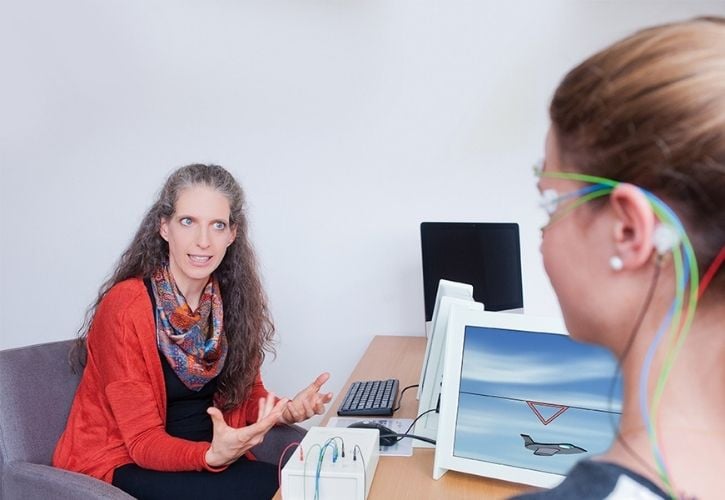ADHD Treatment
Discover the effective treatment options for ADHD utilizing advanced cognitive training techniques combined with sleep coaching.

Straight to:
In recent decades, neuroscientists and healthcare professionals have a better understanding of ADHD and its treatment. We are now able to explain and address the underlying causes of ADHD and offer more personalised treatment with sustainable outcomes. Brain training techniques and treatments that pay attention to sleep hygiene have proven effective for children and adults with ADHD and can offer a longer-term solution. This can be particularly beneficial to patients who have not found any benefit from ADHD medications or wish to avoid the side effects.
What is ADHD and who is affected?
ADHD in Children
Children with ADHD might struggle to pay attention or control impulsive behaviours. To the parent or teacher, this can look like they are misbehaving and acting without thinking about the outcome. The child may also exhibit overly active and excitable behaviour.
Diagnosing ADHD in children is not always easy as some of the behaviours associated with the condition are normal childhood behaviours. It takes more than one single test to rule out other conditions with similar symptoms.

ADHD in Adults
In the past, ADHD was believed to primarily affect children and adolescents, with symptoms often diminishing in adulthood. Now, due to improved access to healthcare, greater awareness of symptoms, and a decrease in the stigma surrounding treatment, more adults are receiving ADHD diagnoses.
Adult ADHD is characterised by procrastination, inattention, difficulty engaging and an inability to focus or prioritise. This can significantly impact an individual’s quality of life by hindering their ability to complete tasks, manage time, and maintain relationships.
ADHD is among the most common neurodevelopmental disorders in Australia, affecting 6-7% of children with 65% of those affected continuing to experience symptoms into adulthood.
How Neurofeedback can help ADHD
The human brain is adaptable. Every day, we naturally learn new information and create new neural pathways. Neurofeedback takes advantage of this ability and gives positive reinforcement when the brain activity follows a better pattern. With the help of neurofeedback, we can teach our brains to self-regulate and improve many symptoms of ADHD.
ADHD treatment methods
ADHD Medications
The purpose of medication is to help those with ADHD manage their symptoms during everyday activities.
ADHD medications fall into two categories – fast-acting stimulants and slower-acting but longer-lasting non-stimulants. Like other medications, ADHD medications have side effects. and may cause mood swings and lead to sleep problems, increased irritability and headaches.

Psychotherapy
Psychotherapy has been shown to reduce symptoms in children and adults through the education and reinforcement of coping strategies for core ADHD symptoms. Common elements include a focus on problem solving and planning, strategies to improve attention, impulsivity management, and positive reinforcement.
Psychotherapy avoids the side effects of medication, but it may require months or years to achieve a desired or sustainable outcome.
Learn more about Psychotherapy
Neurofeedback
Neurofeedback is a non-invasive treatment that encourages the brain to develop healthier patterns of activity.
The treatment uses real time visual and auditory feedback to encourage or inhibit specific brain activity. Through this process you learn to voluntarily regulate healthy brain states and reduce counterproductive processes (e.g. agitation, impulsivity or distraction and drowsiness).
neurocare's Neurofeedback program is an evidence based structured treatment program that delivers long lasting results.
Treatment is recommended at least two times per week and a full course is normally completed within 2-3 months. Positive results can be seen as early as 3-4 weeks.
Frequently Asked Questions about ADHD treatment
-
Yes. Numerous studies have recorded the positive effects of Neurofeedback, mostly to treat symptoms of ADHD, but also in other areas such as Insomnia, cognitive performance, sports performance, anxiety among other trials. Neurofeedback as a therapy for ADHD has been systematically reviewed and tested for more than three decades and most recently breakthrough data has demonstrated its positive effects in large-scale multi-centre, placebo-controlled trials, which means that the studies have adhered to rigorous scientific testing. You can read more on these studies in our Scientific Publications sections.
-
Yes. Neurofeedback uses positive reinforcement to increase the frequency of healthy patterns of brain activity. Through intensive training these patterns become automatic. Once established, the positive benefits from these new patterns is self-sustaining, and the changes long-lasting.
Refer to our Scientific Publications page for studies on the long term effectiveness of Neurofeedback.
Not sure if our services are right for you?



